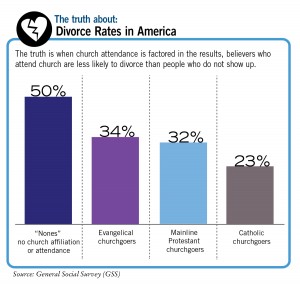Editors note: This happens to be e pet peeve of mine. You ever hear the one about candy canes?
Maybe not in theology, but in facts.
Like this one, which came halfway through one preacher’s sermon on marriage recently: There’s no difference between people sitting in these pews and everyone else when it comes to divorce, the preacher told the congregation.
It made a great sermon illustration. Only it’s not true, said Bradley Wright, a sociologist at the University of Connecticut and author of “Christians Are Hate-Filled Hypocrites … and Other Lies You’ve Been Told.”
Wright, who has been writing about faith and divorce rates since 2006, looked at statistics from the General Social Survey (GSS), a national random survey of Americans taken since the 1970s. Half of the “Nones” — people who claim no religious identity — were divorced. Only 42 percent of self-identified Christians — and members of other faiths — were divorced.
Believers who show up to church every week were even less likely to divorce. Wright found that only about a third of evangelicals (34 percent) and mainline Protestants (32 percent) and a quarter of Catholics (23 percent) who go to church are divorced.
Still, the myth that churchgoers divorce at the same rate as everyone else persists. Wright thinks people pay more attention to bad news than to good news.
“We pay a lot more attention to things that are dangerous,” he said. “If I’m driving down the road, I can pass 200 parked cars and not notice them. But if I see an accident — I will stop and look.”
Mark Regnerus, a sociologist at the University of Texas in Austin, said a “confirmation bias” might be at work. In other words, people like statistics that reinforce their beliefs. If people are fearful that marriages are in trouble, he said, they’ll tend to believe statistics that confirm those fears, even if those statistics aren’t exactly right.
Regnerus said using bad statistics about marriage can be appealing because bad news can motivate people to action. But it can also undermine the credibility of a pastor’s message.
“I am glad pastors want to strengthen marriages,” he said. “And bad news can be galvanizing…. But we trust our pastors to tell us the truth.”
Are Christians really bad tippers?
Marriage isn’t the only subject where perceptions about Christians don’t match the statistics. It’s also the case with tips believers leave servers at restaurants.
Earlier this year, a trip out to eat turned into a nightmare for Alois Bell of the World Deliverance Ministries Church in Granite City, Ill. She and a group of friends went to Applebees. Their server, Chelsea Welch, added an automatic tip to the bills in keeping with company policy.
Bell was not pleased. “I give God 10%,” she wrote on the bill. “Why do you get 18?”
Welch posted the check on Facebook and it went viral. She eventually was fired, while Bell apologized (indicating she’d left a cash tip) after her note made headlines.
Turns out Welsh isn’t the only server to have a bad run-in with church folks.
Karen Swallow Prior, an English professor at Liberty University, worked her way through college as a waitress. Christians were notorious for being bad tippers, she wrote in a piece for Christianity Today’s website.
“My fellow servers called them the ‘Holy Rollers,'” she wrote. “Knowing there would be little, if any, tip left at the end of their meal, the servers saw the Christians’ robust attempts at ‘friendliness’ instead as pushy and arrogant. The memories still pain me now.”
But a study from Michael Lynn of Cornell University and Benjamin Katz of HCD Research, showed that, overall, Christians are pretty good tippers. Their online survey of 1,068 Americans found that the average Christian tipped 17 percent for good service. Only 13 percent of Christians left a smaller tip for good service.
There are a lot Christians out there — and since people tend to remember bad news, a few bad tippers give all the other Christians a bad name.
The sky is falling phenomenon
Statistics about the future of the church also give pastors and other church leaders a hard time. Like this one: “94 percent of Christian young people leave the church never to return,” which was used to promote a major Christian conference several years ago.
It’s partly true — many young people do tend to drop out of church. A 2009 LifeWay Research study of 1,000 young Protestants found that seven of 10 stopped attending church for a time after high school.
A few more details: The students surveyed had all attended church for at least a year in high school. Most dropped out because of a life change — such as going to college — and just over a third had come back to church by age 30.
The idea of anyone dropping out of church is a concern, but there’s no sign that the vast majority of young people are forsaking the church.
Left-handed people, Texans, cats
Another bad statistics was used by a megachurch pastor to promote a Christian conference: “There are more left-handed people, more Texans, and more pet cats than evangelicals in America.” Actually, one-third of the claim is true.
There are more cats (and dogs) than evangelicals in the U.S. But not Texans or southpaws.
While there are about 95 million cats in the U.S., according to the Humane Society, there are between 50 million (Religious Congregations & Membership Study, 2010) and 75 million evangelicals (Pew Research).
That’s more than the estimated number of southpaws — between 30 and 45 million Americans — and Texans (26.6 million, according to the U.S. Census).
Bad statistics persist because they work — at least in the short term: They can help sell books and tickets to conferences, make good sermon illustrations and get people in church fired up. The problem, said Ed Stetzer, president of LifeWay Research, is that bad statistics don’t solve real problems.
It’s difficult to solve a problem when you don’t understand it, Stetzer said.
Too many bad statistics can also undermine a leader’s credibility. Get too many facts wrong, and it’s harder for people to trust.
Setting the record straight
Stetzer said Christians should view all statistics with healthy skepticism. That’s especially true if a statistic is found in an advertisement. Ads, Stetzer said, are used to sell things. They’re not particularly concerned with getting the facts right. Also, be wary of any statistic that can’t be verified.
“Ask, how do you know that?” Stezter said. “If you can’t think of a way to verify a statistic, it’s probably not true.”
Stetzer also said to beware of stats that don’t match reality, noting, “It’s OK to apply your own censor, to say this doesn’t make sense.”
It’s important to realize all research is imperfect and context matters. Researchers don’t have unlimited resources. They can’t interview or poll everyone. Instead, they interview a representative sample of people, asking a few questions.
So go to the source. Find out who did the research, how many people they interviewed and what specific questions were asked, before assuming the research is valid.
For example, a poll from professional researchers using a large sample will likely be more reliable than an informal poll taken by a professor of the students in class.
Finally, look at more than one study.
“To understand the whole picture, responsible researchers look at various studies, their methodologies, and their results,” Stetzer wrote in a 2010 story about bad statistics for Christianity Today. “We reach bad conclusions when we latch onto one finding of one study, drag it out of context, and proclaim it from the rooftops without knowing whether our interpretation is justified.”
Facts are our friends, as Stetzer often says. Just make sure the facts are true.








